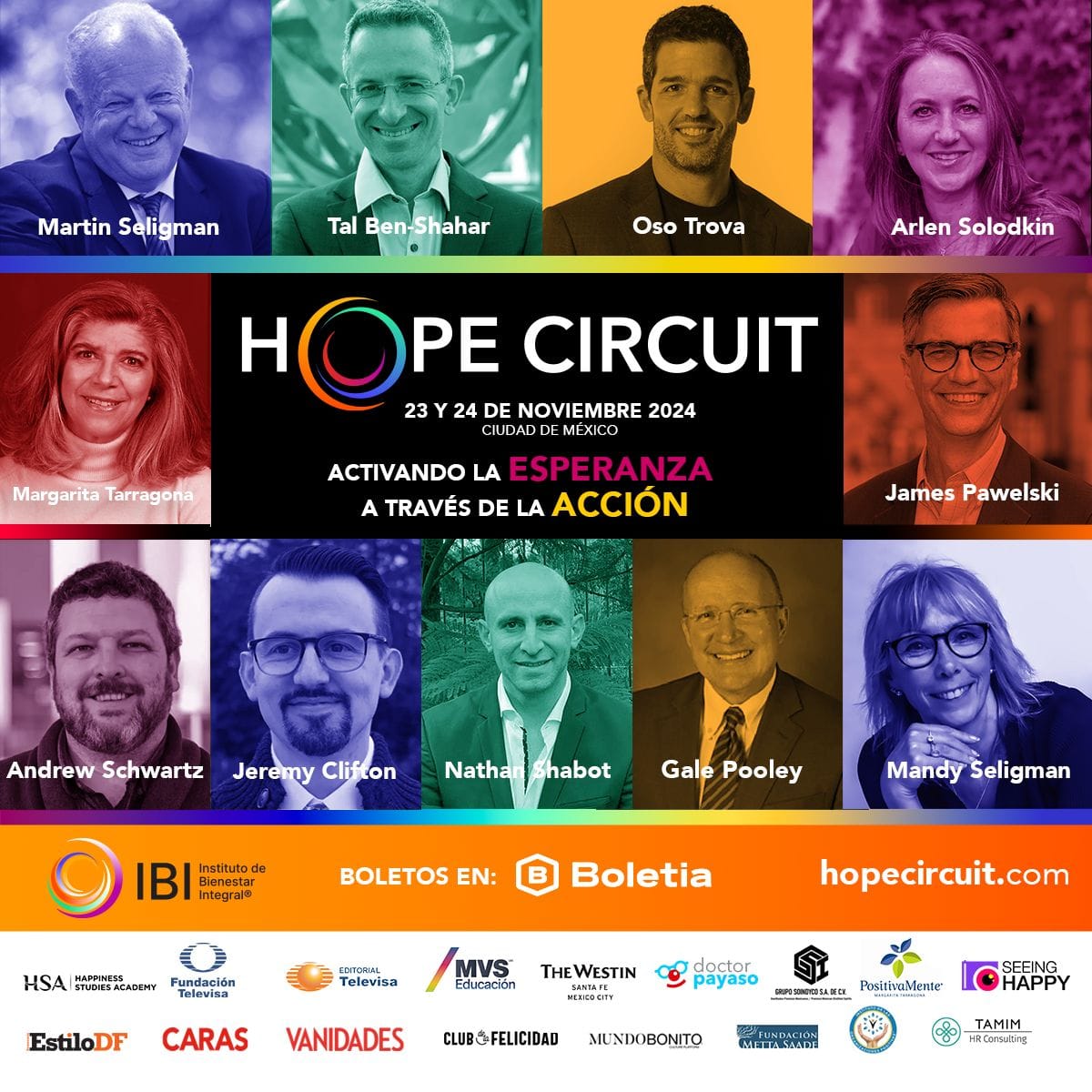Por Arlen Solodkin

La psicología positiva es una rama de la psicología que surgió a finales de la década de los noventa gracias al trabajo del psicólogo Martin Seligman, su fundador y que entonces era director de la Asociación Americana de Psicología (American Psychological Association). Tras muchos años de investigación en el área de desamparo aprendido, Seligman resaltó la importancia de entender la salud emocional y el bienestar integral como algo más que la ausencia de enfermedad.
En un principio, la psicología se centró especialmente en la psicopatología, en el dolor y sus causas. Esto es, en el estudio de las personas que se encontraban atravesando momentos de sufrimiento, así como los posibles tratamientos que pudieran brindarles alivio. Sin embargo, al enfocarse en lo que no funciona del ser humano, la psicología se olvidó de estudiar a un gran porcentaje de la población. Dejó a un lado el estudio de aquellas personas que se sienten plenas, felices y realizadas, así como todas esas cualidades y fortalezas que hacen que una persona se sienta bien y que contribuyen a una vida plena.
Desde sus inicios, este enfoque ha suscitado un amplio interés académico y práctico, resultando en numerosos estudios que demuestran que las personas más felices tienden a tener un mejor desempeño en sus trabajos, estudios, relaciones interpersonales más satisfactorias y mejor cuidado de su salud. Por ejemplo, el World Happiness Report indica que los países que implementan políticas públicas centradas en el bienestar, como la inversión en salud mental y educación positiva, tienden a experimentar mayores niveles de felicidad y productividad social.
Esto no debe sorprendernos por su lógica, sin embargo, a lo largo de cientos de años, hemos descalificado la importancia de las llamadas herramientas blandas, o conocidas hoy en día como habilidades psicosociales y psicoemocionales. Durante los 10 años de trabajo con instituciones educativas y organizaciones en varias partes del mundo, algunos de los problemas que hemos detectado en el Instituto de Bienestar Integral son la ausencia o errores de liderazgo, la falta de confianza institucional, la baja motivación de los colaboradores, la falta de reconocimiento y pertenencia. Aspectos comúnmente denominados blandos, que, al no recibir la atención debida, tienen un impacto en el bottom line de las organizaciones, impactando así los datos duros, los KPI, los índices de rotación, la atención al cliente, la capacidad de innovación en entornos cambiantes y los niveles de creatividad en las organizaciones.
Dentro del trabajo que hemos realizado, por ejemplo, en la Universidad Nacional de Costa Rica, implementamos un programa en el Departamento de Bienestar Estudiantil hace cuatro años, a raíz de la pandemia, que propició la colaboración del equipo para la creación e implementación de iniciativas puntuales que siguen impactando tanto al equipo de colaboradores como a sus estudiantes. En un programa de liderazgo positivo que desarrollamos para una institución financiera en México, los colaboradores reportaron altos niveles de agradecimiento y mattering, la sensación de sentirse parte importante de la organización, por el simple hecho de recibir una formación que veía a los colaboradores como seres humanos y en su integralidad. Trabajando con líderes de todas partes del mundo a través de la Certificación en Estudios de la felicidad creada por el Dr. Tal Ben-Shahar, los participantes reportan que las herramientas y habilidades adquiridas han sido un parteaguas en su vida personal y profesional. Al día de hoy, hemos formado a más de 2,000 personas y la comunidad es más potente que nunca. Cuando cambias la mirada del déficit al potencial, suceden milagros dentro de las personas y en sus organizaciones.
Desde que Seligman alumbró un nuevo horizonte, han sido muchos los estudios que se han llevado a cabo en las mejores universidades del mundo en diversas áreas de conocimiento relacionadas con temas tales como la felicidad, el sentido de vida, las emociones positivas, la resiliencia, las fortalezas de carácter, la mentalidad de crecimiento, la esperanza, las virtudes, los valores, las relaciones positivas, entre muchas otras.
Actualmente, los conocimientos de la Psicología Positiva se han aplicado tanto en el ámbito de desarrollo personal como en el ámbito institucional. Sus aplicaciones han provisto de herramientas prácticas a organizaciones, aumentando los niveles de productividad, involucramiento, satisfacción laboral, sentido en el trabajo, mejorando las relaciones interpersonales, aumentando los niveles de creatividad y compromiso. Gracias a este enfoque, se ha logrado reducir el ausentismo laboral, los niveles de estrés, la apatía y el “burn-out”. Organizaciones como Google y Zappos han adoptado principios de psicología positiva para fomentar culturas laborales saludables. Estas empresas han reportado incrementos en la satisfacción laboral, la creatividad y el compromiso, así como una notable reducción en el ausentismo y el estrés.
Para las instituciones educativas, integrar contenido sobre bienestar, felicidad y resiliencia significa un mejor rendimiento académico. En un estudio de la fundación Robert Wood Johnson apoyado por el departamento de educación de los Estados Unidos, crearon una escala de 5 puntos para medir las competencias sociales de los niños desde preescolar hasta los 20 años y encontraron que, por cada incremento de un punto en las habilidades sociales, los pequeños tenían el doble de probabilidad de obtener un diploma universitario, 54% más de probabilidad de terminar el colegio y 46% más de lograr tener un trabajo de tiempo completo.
Es importante subrayar que, la psicología positiva no busca reemplazar a la psicología tradicional, sino complementarla, ofreciendo herramientas prácticas para el desarrollo personal y la mejora organizacional. A través del estudio de fortalezas como la resiliencia, el optimismo y la gratitud, se abre la puerta a un futuro más prometedor y satisfactorio. La aplicación de estos principios en nuestras vidas cotidianas puede guiarnos hacia una existencia más plena y responsable, tanto a nivel individual como colectivo.
Así como el oxígeno es el elemento que nos mantiene vivos, dentro de una era donde la depresión y la ansiedad han ido haciéndose cada vez más comunes, el optimismo, la fe y la esperanza se han convertido en el antídoto que nos ofrece la posibilidad de seguir adelante. Dentro de un contexto donde la competitividad, la tecnología y la velocidad nos mantiene alienados, la psicología positiva nos ayuda a recordar lo que realmente importa y a retomar las virtudes y fortalezas para construir una vida que valga la pena ser vivida.
*Fundadora y directora del Instituto de Bienestar Integral y el encuentro Hope Circuit
**SOBRE HORPE CIRCUIT
Hope Circuit es el encuentro internacional que reúne a los líderes más reconocidos en los campos del bienestar integral, la felicidad y el progreso humano; que se llevará a cabo el 23 y 24 de noviembre en el Hotel Westin de Santa Fe de la CDMX como la primera de otras acciones que buscan crear un futuro más positivo para nuestro país. En las próximas publicaciones compartiremos herramientas prácticas y los hallazgos de líderes mundiales que estarán en Hope Circuit, como el Dr. Martin Seligman, considerado uno de los psicólogos más influyentes de nuestros tiempos; el Dr. Tal Ben-Shahar, profesor del curso más popular en la Universidad de Harvar o Andrew Schwartz, director del World Wellbeing Project, con el fin de desafiar el status quo y enriquecer a nuestra comunidad para que juntos podamos encontrar soluciones que nos ayuden a construir un futuro de mayor optimismo, empatía y esperanza.

Las opiniones expresadas son responsabilidad de sus autoras y son absolutamente independientes a la postura y línea editorial de Opinión 51.






Comments ()